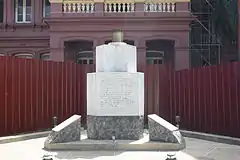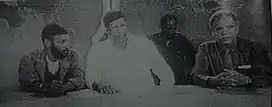Jamaat al Muslimeen coup attempt
The Jamaat al Muslimeen coup attempt was an attempt to overthrow the government of Trinidad and Tobago, instigated on Friday, 27 July 1990. Over the course of six days, Jamaat al Muslimeen, a radical Islamic group, held hostages (including Prime Minister A. N. R. Robinson and other government officials) at the Red House and at the headquarters of the state-owned national television broadcaster, Trinidad and Tobago Television (TTT). On 1 August, the insurgents surrendered. They were charged with treason, but were ordered released by the Court of Appeal.
 Eternal flame and 1990 Coup Attempt Memorial, the Red House, Port of Spain, Trinidad and Tobago | |
| Date | 27 July – 1 August 1990 |
|---|---|
| Location | Trinidad and Tobago |
| Participants | Jamaat al Muslimeen and the Republic of Trinidad and Tobago (incl. the Government of Trinidad and Tobago, Trinidad and Tobago Police Service, and Trinidad and Tobago Defence Force) |
| Outcome | Government victory (coup suppression, 24 people dead, millions of dollars in property damage and losses) |
Background
Conflict over No. 1 Mucurapo Road
The Jamaat al Muslimeen was founded in 1982 by Yasin Abu Bakr, a former policeman and convert to Islam, and established a compound at No. 1 Mucurapo Road in Port of Spain, on land owned by the Port of Spain City Corporation. In 1969, the property was granted to the Islamic Missionaries Guild (IMG) by the government of Trinidad and Tobago, but the transfer had never completed because the land belonged to the city, not the central government. In 1984 a court ordered the Muslimeen to vacate the property and demolish the buildings they had constructed without planning permission, including an incomplete mosque. Abu Bakr refused to comply and served a 21-day jail sentence for contempt of court in 1985.[1][2]
Anti-drug campaign
In the mid-1980s the Muslimeen launched a vigilante campaign against the illegal drug trade. Muslimeen members drove drug dealers out of "drug blocks" and seized cocaine, marijuana and weapons. They organised their members into a paramilitary force and used their reputation to recruit more members, especially among the disaffected Afro-Trinidadian youth of Port of Spain.[1][3]
Political and economic climate
After winning the general elections in December 1986, the National Alliance for Reconstruction (NAR) government implemented policies to deal with an economic decline triggered by a combination of declining petroleum production and falling oil prices.[4][5]:410–417 The unemployment rate had risen from a low of 10% in 1981 to a high of 22% in 1986.[5]:421 The NAR government implemented a programme of spending cuts, tax increases and devalued the Trinidad and Tobago dollar in an attempt to reverse the country's economic decline. Cost of living adjustments (COLA) to public servants were suspended in 1987 and their salaries were cut by 10% in 1990. A value-added tax (VAT) was also introduced in the 1990 budget.[4]
Dissent within the ruling party led to a split within the NAR government. Four former members of the United Labour Front who were expelled from Cabinet formed the Caucus for Love, Unity and Brotherhood (CLUB 88) in March 1988, and went on to form a new party, the United National Congress, on 16 March 1988.[5]:436–470
In response to the government's economic austerity programmes, trade unions organised a one-day strike on 6 March 1989, and a March Against Hunger on 22 April. On 8 February 1990 a group of 16 trade unions and a variety of civil society organisations including the Jamaat al Muslimeen formed the Summit of People's Organisations (SOPO).[4] In the eight weeks preceding the coup attempt, nurses had engaged in ongoing street protests in Port of Spain.[6]
The government's Social Welfare Department and the public hospitals lacked the resources to handle the increase in demands for their services. The Muslimeen stepped in, offering food, eyeglass frames, and organising medical and dental appointments. For the unemployed and homeless, especially young men, they provided structure and belonging.[5]:470–477
Escalation
In 1988, police raided the Jamaat al Muslimeen commune, seizing weapons and ammunition and arresting 34 members. The members were charged with larceny, robbery, illegal possession of weapons, rape and murder. This event led members of Jamaat al Muslimeen to believe that the government was being oppressive and had illegally occupied their land. Before the coup d'état attempt, Abu Bakr was arrested several times on charges of contempt of court and illegal demonstrations.[7]
According to a 2014 interview by former minister of communications Gerald Hadeed, two days before the coup attempt, Prime Minister Robinson was warned that there might be an attempt to overthrow his government on that day and he was asked to have the scheduled sitting postponed. Robinson declined, however, claiming that he had taken an oath of office and he would not deviate from it in front of a potential threat.[8]
Coup d'état attempt

On Friday 27 July 1990 the Jamaat al Muslimeen attempted to stage a coup d'état against the government of Trinidad and Tobago. Forty-two insurgents stormed the Red House, the seat of Parliament, and took Robinson and most of his cabinet hostage, while seventy-two of their accomplices attacked the offices of Trinidad and Tobago Television (TTT), the only television station in the country at that time, and the National Broadcasting Service (NBS Radio), then one of only two radio stations in the country at 610 AM. At 6:00 pm, Yasin Abu Bakr appeared on television and announced that the government had been overthrown and that he was negotiating with the army. He called for calm and said that there should be no looting.[9]
Robinson was beaten, degraded and shot in the lower right leg when he tried to order the army to attack the militants. The army and the police responded by sealing off the area around the Red House. Widespread looting and arson took place in Port of Spain and other parts of the East–West Corridor, but the remainder of the country was calm. American Airlines and British Airways cancelled all flights to the capital city.[7] A state of emergency was declared by acting president Emmanuel Carter.
Several cabinet members who had not been present in the Red House at the time of the attack set up office in the Trinidad Hilton. On the night of 27 July, the army took control of the TTT transmitter on Cumberland Hill, thus taking TTT off the air. After six days of negotiation, the Muslimeen surrendered on 1 August and were taken into custody.[10]
Aftermath
The Jamaat al Muslimeen members who surrendered were tried for treason, but the Court of Appeal upheld the amnesty offered to secure their surrender, and they were released. The Judicial Committee of the Privy Council later invalidated the amnesty, but they were not re-arrested.[11]
About 24 people died during the coup attempt, with millions of Trinidad and Tobago dollars in property losses. Among the dead was the Member of Parliament for Diego Martin Central, Leo Des Vignes. Many people saw the coup attempt as the end of the power of the National Alliance for Reconstruction government.[11]
In the aftermath of the 11 September attacks in the United States, Trinidad and Tobago police raided three mosques but no weapons were found. On 22 September, Abu Bakr was detained and questioned for two hours at London's Heathrow airport while en route to an Islamic conference in Libya. Trinidadian police accused the group of receiving money and training from Libya and Sudan. In the same year, Florida police uncovered a plot to smuggle 60 rifles and 10 submachine guns to the Jamaat in Trinidad.[12]
In late July or early August 2010, the court ruled that many properties owned by the Jamaat would be sold to make up for the cost of the destruction of buildings in the coup attempt. An inquiry was formally launched in 2010. On 13 March 2014, the final report[13] was presented to President Anthony Carmona.[14]
Four books have been written about the attempted coup: "The Muslimeen grab for power: Race, religion, and revolution in Trinidad and Tobago" by political scientist Professor Selwyn Ryan and "A society under siege: a study of political confusion and legal mysticism" by criminologist Professor Ramesh Deosaran both documenting the background, culmination and immediate aftermath of the attempted coup. "Days of Wrath: The 1990 Coup in Trinidad and Tobago" by journalist Raoul Pantin, gives an account of his experience as one of the hostages at TTT, and "1990: The Personal Account of a Journalist Under Siege"[15] by journalist Dennis McComie who had the humanitarian task to inform the public throughout the ordeal via the lone functioning radio station – NBS Radio 610AM/100FM.
References
- Mahabir, C. (1 January 2013). "Allah's Outlaws: The Jamaat al Muslimeen of Trinidad and Tobago". British Journal of Criminology. 53 (1): 59–73. doi:10.1093/bjc/azs058. ISSN 0007-0955.
- Ragoonath, Bishnu (1993). "The failure of the Abu Bakr coup: The plural society, cultural traditions and political development in Trinidad". The Journal of Commonwealth & Comparative Politics. 31 (2): 33–53. doi:10.1080/14662049308447655. ISSN 0306-3631.
- Pantin, Raoul A. (2007). "Day One: A Bloody Coup". Days of wrath : the 1990 coup in Trinidad and Tobago. New York: iUniverse. pp. 1–32. ISBN 978-0-595-88646-3. OCLC 172981523.
- Meighoo, Kirk Peter (2003). "The Fall of the NAR, 1987-1991: 'Between Good Intentions and Effective Implementation'". Politics in a half made society: Trinidad and Tobago, 1925–2001. Kingston, Jamaica: Ian Randle Publishers. pp. 120–155. ISBN 1558763066. OCLC 51587787.
- Report of the Commission of Enquiry appointed to enquire into the events surrounding the attempted coup d'état of 27th July 1990 (PDF). 2014.
- Abdulah, David (1991). "Jamaat al Muslimeen Insurrection in Trinidad and Tobago, 1990". Caribbean Quarterly. 37 (2–3): 84–88. doi:10.1080/00086495.1991.11671731. ISSN 0008-6495.
- "Attempted Coup in Trinidad". Terrorism Watch & Warning. terrorism.com. 23 April 2014. Archived from the original on 11 October 2014. Retrieved 22 July 2014.
- "Hadeed: I warned Robinson about 1990 coup attempt". Trinidad Express. 6 April 2014. Archived from the original on 10 April 2014. Retrieved 22 July 2014.
- "28 years later: 5 unforgettable moments of 1990 attempted coup". LoopTT.
- "Trinidad marks 1990 coup attempt". BBC News. 27 July 2010. Retrieved 27 July 2020.
- Robert Walker (3 June 2007). "Profile: Jamaat al Muslimeen". BBC News. Retrieved 22 July 2014.
- Angela Potter (1 November 2001). "Trinidad Muslims Being Closely Monitored". Canarsie Courier. Archived from the original on 16 June 2011. Retrieved 22 July 2014.
- "President gets final coup report today". Trinidad Guardian. 13 March 2014.
- "Report of the Commission of Enquiry" (PDF). Parliament of Trinidad and Tobago. Retrieved 22 July 2014.
- Quash, Car-ol. "McComie recalls 1990". www.guardian.co.tt. Retrieved 20 July 2020.